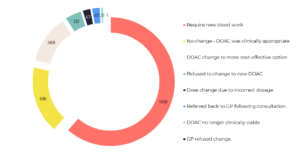Optimising DOAC Therapy: A collaborative approach to improved patient care and cost efficiency

By Selma Abed, Head of Medicines Optimisation, Spirit Health, and Duncan Richardson, Head of Service Delivery, Spirit Health.
Spirit Health
As an independent service provider to the NHS for over 15 years, Spirit Health do things differently. We specialise in partnering with NHS Medicines Optimisation teams to provide products and clinical services that help deliver cost efficiencies and quality improvements in patient outcomes.
The situation
Direct-acting oral anticoagulants (DOACs) are widely recognised as alternative anticoagulants to prevent strokes in patients with Atrial Fibrillation (AF). There are four DOACs available; the aim was to optimise care for all patients prescribed a DOAC for NV-AF and to review patients prescribed apixaban to see if a lower-cost alternative could be used. When the work was undertaken, apixaban was the highest-costing drug to the NHS in England in the 2022/23 period.
The issue is that stroke and bleeding risks change over time, so medication needs to be reviewed annually. This requires high levels of collaboration between primary and secondary care to review all eligible patient medication for drug interactions, over-the-counter medications and herbal/alternative therapies.
The opportunity was to optimise the quality of care for patients on a DOAC across a locality and review if an alternative lower-priced DOAC was suitable. Carried out between October 2022 to May 2023, the work would ensure patients were on the appropriate DOAC and dose regime for their renal function, liver function, weight, co-morbidities, and medication to ensure optimal oral anticoagulant (OAC) therapy.
Objective
The main objectives were to optimise care for all patients prescribed a DOAC for NV-AF and to review patients’ prescribed apixaban to see if a lower-cost alternative could be used.
The Spirit Active Implementation™ team identified all patients on existing DOAC therapy, checking patient eligibility to change through up-to-date patient blood records, calculating Creatinine Clearance, CHA2DS2-VASc7 and HAS-BLED/ORBIT scores. They also discussed any patients with incorrect doses/significant interactions/safety concerns or identified issues with the appropriate clinician.
To fulfil the objectives, the project required continual collaboration between the Spirit Active Implementation™ team with multiple GP practice staff, secondary care HCPs, and multiple stakeholders across the locality.
The review service not only highlighted those who were eligible to be switched to a lower-cost DOAC alternative but also identified:
- Patients requiring alternative medication
- Dosage adjustments needed
- Enhanced monitoring required
- Drug interaction identified
Ultimately, the work improved patients’ care beyond the project’s original scope and highlighted additional patients who required further attention to optimise their DOAC therapy.
Scalability of work
From a patient quality perspective, the project’s learnings hold promise for broader impact, potentially on a national scale. From a cost-savings lens, the works highlight potential roadblocks to scaling. However, these can be overcome using the learnings from the project.
Positive signs for scalability include:
- Successful collaboration: The project effectively partnered with secondary care, indicating this approach could be replicated across national localities when specialist advice is required.
- Spirit’s resource potential: Utilising our nurses, pharmacists and technicians for patient communication and assessment demonstrates the potential to scale within busy primary care environments.
- Identified needs: The project revealed a significant portion of patients requiring updated bloodwork or an intervention, suggesting a broader population likely benefits from similar assessments.
- Potential for broader savings: The project identified opportunities for cost savings beyond the initial medication switches. When clinically appropriate, the availability of generic DOAC alternatives presents further avenues for cost reduction, assuming sufficient supply and adherence to clinical guidelines for DOAC selection.
Challenges to consider include:
- Return on investment: Existing primary care capacity constraints led to outdated patient bloodwork, impacting potential cost-saving medication switches for 56% of patients, thus affecting the savings benefit of the work.
Evidence of success
The work demonstrates an innovative quality review project to optimise patient care for those prescribed a DOAC for AF. It offers evidence of important changes with the potential to impact multiple stakeholders.
Delivered change:
- Improved Patient Care: Identified 1224 patients requiring intervention across 25 practices, including medication adjustments, discontinuation, or additional monitoring, impacting their individual health outcomes.
- Cost-Effectiveness: Identified 32 per cent patients potentially eligible for a more cost-effective medication, offering substantial savings for the locality.
- Enhanced Collaboration: Actively supported collaboration between nine key stakeholders across primary and secondary care, with an average of three meetings per stakeholder (including two face-to-face and one virtual), across a total of 3489 patients.
- Proactive Approach: The project identified 1,938 patients with outdated blood work and weight measurements, these findings were communicated to the locality for further assessment. Additionally, direct intervention was taken by Spirit for 1,551 patients whose records were up to date. This two-pronged approach demonstrates a proactive strategy to address both immediate needs and potential future concerns before symptoms arise.
Number of interventions identified in locality DOAC review service
Potential impact:
- Patients: Improved health outcomes, reduced medication errors, and potentially lower medication costs.
- Healthcare System: Cost savings through prescription switches and potentially reduced hospital stays due to improved preventative care.
- Healthcare Providers: Up-to-date patient records and enhanced AF training, potentially leading to better patient outcomes.
- Future Initiatives: Provides valuable insights and a potential model for broader implementation of similar quality review programs.
This quality review service is a compelling example of how such initiatives can improve patient outcomes, optimise healthcare systems, and empower providers.
Next steps
To see how Spirit Health delivers results and to learn more about their success in optimising therapy areas, please click here.
To explore how to improve patient care and reduce costs, contact Spirit Health today to discuss a partnership for your current and future medicines optimisation reviews.
